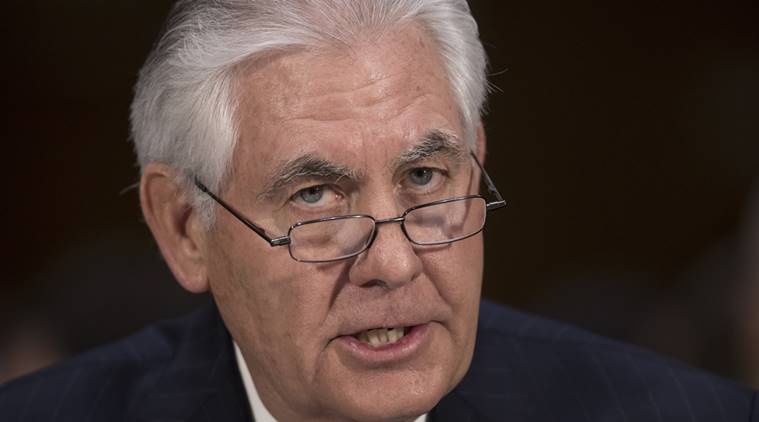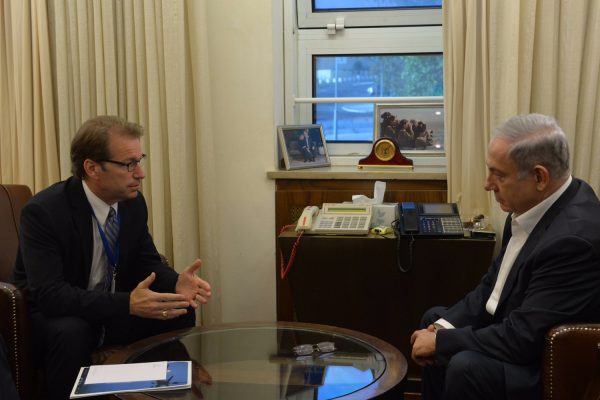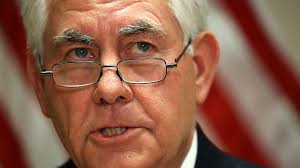
The shooting, in which an Israeli security guard killed two Jordanians after being attacked by one of them with a screwdriver, led to a diplomatic standoff between the two countries at a time when Jordan is heavily involved in efforts to defuse the crisis over the Jerusalem holy site. Jordan is the Muslim custodian of the shrine, which is also holy to Jews.
Jordanian officials said Monday that the guard could only leave if he first submitted to questioning, according to a news site linked to Jordan’s military. Israel insisted the guard has diplomatic immunity.
Israeli Prime Minister Benjamin Netanyahu said he spoke to the guard and assured him that Israel has experience in dealing with such situation and would bring him home.
The drama played out as President Donald Trump’s Mideast envoy, Jason Greenblatt, headed to the Holy Land on Monday. It was the first sign of a high-level, on-the-ground attempt by the Trump administration to end the standoff between Israel and the Muslim world.
The escalation began earlier this month when Arab gunmen fired from the holy site, killing two Israeli policemen. In response, Israel installed metal detectors at the site, a move that incensed the Muslim world.
The shooting at Israel’s embassy in the Jordanian capital of Amman could further inflame Jordanian public opinion against Israel.
The Amman shooting took place on Sunday evening in a residential building used by the embassy staff.
Israel’s Foreign Ministry said the incident began when two Jordanian workmen arrived at the building to replace furniture. It said one of the workers, later identified as a 17-year-old of Palestinian origin, attacked an Israeli security guard with a screwdriver.
The guard opened fire, killing the teen. A second Jordanian, the owner of the building who was also a physician, was hit by gunfire and later died of his wounds. The guard was lightly hurt, the ministry said.
The Jordanian news site Hala Akhbar, which is linked to the kingdom’s military, quoted diplomatic and security officials as saying that Jordan refused to let the guard leave without an investigation.
The website quoted the officials as saying that Jordan might take “diplomatic measures” if Israel refuses to meet the demand.
Israel’s Foreign Ministry did not refer to Jordanian demands, but said the guard enjoys diplomatic immunity under international conventions.
An Israeli government official said talks were under way whether to evacuate the embassy staff, given the tensions in Jordan.
He said either all or none of the staff would be evacuated, and that the security guard would not be left behind. The official spoke on condition of anonymity because he was not authorized to discuss the diplomatic efforts underway to defuse the situation.
The father of the slain teen on Monday called for an investigation and said he would not bury his son until he was shown security camera footage of the investigation.
Zakariah al-Jawawdeh told The Associated Press that his son Mohammed is a “son of Jordan who was shot on Jordanian soil” and he deserved justice. He described Mohammed as apolitical.
Israel’s security Cabinet met from late Sunday until the early hours of Monday to discuss the crisis at the shrine and the embassy shooting, and was to convene again Monday afternoon.
Netanyahu said Israel is in regular contact “with security and government officials on all levels in Amman to bring as speedy a resolution as possible to this event.”
Israel and Jordan signed a peace deal in 1994, but the agreement remains deeply unpopular in the kingdom where many residents are of Palestinian origin. Jordan and Israel have close security ties, but frequently clash over Israeli policies at the Jerusalem shrine.
Jordan’s ruling Hashemite dynasty, said to trace its ancestry to the Prophet Muhammad, draws much of its legitimacy from its role as protector of the shrine.
Meanwhile, the security Cabinet reached no decision after a six-hour meeting on how to defuse the crisis over the Jerusalem shrine, Israeli media said. The ministers were reportedly reviewing the initial decision on installing the metal detectors and weighing possible alternatives.
Israel has said the metal detectors were a needed security measure to prevent future attacks. However, the government is facing growing domestic criticism, with some commentators saying it did not fully weigh all the repercussions of introducing new measures at the most volatile spot of the Israeli-Palestinian conflict.
Muslim religious leaders have alleged that Israel is trying to expand its control at the site under the guise of security – a claim Israel denies. The tensions have led to mass prayer protests and deadly Israeli-Palestinian violence.
Ikrema Sabri, a senior Muslim cleric, said Monday that Jerusalem’s police chief, Yoram Halevi, met a day earlier with a lawyer representing the Muslim leadership to discuss solutions to the crisis.
Sabri said newly installed security cameras, described in media reports as a possible alternative to the metal detectors, were discussed.
He said the lawyer was to brief the Muslim leadership later Monday on Israel’s responses.
In another sign of the tense atmosphere, a Palestinian assailant stabbed an Arab citizen of Israel in the neck in central Israel, apparently mistaking him for a Jew, police said. The assailant was detained.
The 37-acre walled compound is the third holiest site of Islam, after Mecca and Medina in Saudi Arabia. It is also the holiest site of Judaism, revered as the place where biblical Temples once stood.
—A deadly shooting at Israel’s Embassy in Jordan further complicated Israeli government efforts on Monday to find a way out of an escalating crisis over Jerusalem’s most contested holy site, including mass Muslim prayer protests and Israeli-Palestinian violence.
The shooting, in which an Israeli security guard killed two Jordanians after being attacked by one of them with a screwdriver, led to a diplomatic standoff between the two countries at a time when Jordan is heavily involved in efforts to defuse the crisis over the Jerusalem holy site. Jordan is the Muslim custodian of the shrine, which is also holy to Jews.
Jordanian officials said Monday that the guard could only leave if he first submitted to questioning, according to a news site linked to Jordan’s military. Israel insisted the guard has diplomatic immunity.
Israeli Prime Minister Benjamin Netanyahu said he spoke to the guard and assured him that Israel has experience in dealing with such situation and would bring him home.
The drama played out as President Donald Trump’s Mideast envoy, Jason Greenblatt, headed to the Holy Land on Monday. It was the first sign of a high-level, on-the-ground attempt by the Trump administration to end the standoff between Israel and the Muslim world.
The escalation began earlier this month when Arab gunmen fired from the holy site, killing two Israeli policemen. In response, Israel installed metal detectors at the site, a move that incensed the Muslim world.
The shooting at Israel’s embassy in the Jordanian capital of Amman could further inflame Jordanian public opinion against Israel.
The Amman shooting took place on Sunday evening in a residential building used by the embassy staff.
Israel’s Foreign Ministry said the incident began when two Jordanian workmen arrived at the building to replace furniture. It said one of the workers, later identified as a 17-year-old of Palestinian origin, attacked an Israeli security guard with a screwdriver.
The guard opened fire, killing the teen. A second Jordanian, the owner of the building who was also a physician, was hit by gunfire and later died of his wounds. The guard was lightly hurt, the ministry said.
The Jordanian news site Hala Akhbar, which is linked to the kingdom’s military, quoted diplomatic and security officials as saying that Jordan refused to let the guard leave without an investigation.
The website quoted the officials as saying that Jordan might take “diplomatic measures” if Israel refuses to meet the demand.
Israel’s Foreign Ministry did not refer to Jordanian demands, but said the guard enjoys diplomatic immunity under international conventions.
An Israeli government official said talks were under way whether to evacuate the embassy staff, given the tensions in Jordan.
He said either all or none of the staff would be evacuated, and that the security guard would not be left behind. The official spoke on condition of anonymity because he was not authorized to discuss the diplomatic efforts underway to defuse the situation.
The father of the slain teen on Monday called for an investigation and said he would not bury his son until he was shown security camera footage of the investigation.
Zakariah al-Jawawdeh told The Associated Press that his son Mohammed is a “son of Jordan who was shot on Jordanian soil” and he deserved justice. He described Mohammed as apolitical.
Israel’s security Cabinet met from late Sunday until the early hours of Monday to discuss the crisis at the shrine and the embassy shooting, and was to convene again Monday afternoon.
Netanyahu said Israel is in regular contact “with security and government officials on all levels in Amman to bring as speedy a resolution as possible to this event.”
Israel and Jordan signed a peace deal in 1994, but the agreement remains deeply unpopular in the kingdom where many residents are of Palestinian origin. Jordan and Israel have close security ties, but frequently clash over Israeli policies at the Jerusalem shrine.
Jordan’s ruling Hashemite dynasty, said to trace its ancestry to the Prophet Muhammad, draws much of its legitimacy from its role as protector of the shrine.
Meanwhile, the security Cabinet reached no decision after a six-hour meeting on how to defuse the crisis over the Jerusalem shrine, Israeli media said. The ministers were reportedly reviewing the initial decision on installing the metal detectors and weighing possible alternatives.
Israel has said the metal detectors were a needed security measure to prevent future attacks. However, the government is facing growing domestic criticism, with some commentators saying it did not fully weigh all the repercussions of introducing new measures at the most volatile spot of the Israeli-Palestinian conflict.
Muslim religious leaders have alleged that Israel is trying to expand its control at the site under the guise of security – a claim Israel denies. The tensions have led to mass prayer protests and deadly Israeli-Palestinian violence.
Ikrema Sabri, a senior Muslim cleric, said Monday that Jerusalem’s police chief, Yoram Halevi, met a day earlier with a lawyer representing the Muslim leadership to discuss solutions to the crisis.
Sabri said newly installed security cameras, described in media reports as a possible alternative to the metal detectors, were discussed.
He said the lawyer was to brief the Muslim leadership later Monday on Israel’s responses.
In another sign of the tense atmosphere, a Palestinian assailant stabbed an Arab citizen of Israel in the neck in central Israel, apparently mistaking him for a Jew, police said. The assailant was detained.
The 37-acre walled compound is the third holiest site of Islam, after Mecca and Medina in Saudi Arabia. It is also the holiest site of Judaism, revered as the place where biblical Temples once stood.
—
Laub reported from Jericho, West Bank. Associated Press Writer Mohammed Daraghmeh in Ramallah, West Bank, and Omar Akour in Amman, Jordan, contributed to this report.
© 2017 The Associated Press.
Laub reported from Jericho, West Bank. Associated Press Writer Mohammed Daraghmeh in Ramallah, West Bank, and Omar Akour in Amman, Jordan, contributed to this report.
© 2017 The Associated Press.
BY: Adam Kredo
The U.S. State Department is facing harsh criticism for claiming in an official report that Israel is to blame for terrorism attacks committed by Palestinians and accusing the Jewish state of being largely responsible for an impasse in peace negotiations, according to a leading member of Congress who is calling on the State Department to correct its “inaccurate and harmful” characterization of Israel.
The State Department, in its latest annual report on the global terrorism situation, blames Israeli security policies for stalling the peace process and claims that Palestinians rarely incite terror attacks.
The claims are coming under fierce criticism from pro-Israel advocates and have prompted one leading member of Congress to formally call on the Trump administration to amend the report to more accurately reflect the situation.

Rep. Peter Roskam (R. Ill.), a staunch supporter of Israel and co-chair of the House Republican Israel Caucus, criticized the latest report in a letter to Secretary of State Rex Tillerson and called on the administration to immediately amend it to portray Palestinian terror attacks as a primary reason for the impasse in peace talks.
The State Department’s current characterization, Roskam claims, is harmful to Israel and likely to impede efforts by the Trump administration to renew peace talks.
“The State Department report includes multiple findings that are both inaccurate and harmful to combating Palestinian terrorism,” Roskam wrote in a letter sent Thursday to the State Department, a copy of which was exclusively obtained by the Washington Free Beacon. “This report wrongly insinuates Israeli security measures on the Temple Mount and a stalled peace process as key forces behind terrorism.”
“Most egregiously,” Roskam adds, “it portrays the PA as innocent peacemakers far removed from being the source of terrorist activity.”
The State Department characterizes Palestinian calls for terrorism and violence against Israel as “rare,” stating: “Explicit calls for violence against Israelis, direct exhortations against Jews, and categorical denials by the [Palestinian Authority] of the possibility of peace with Israel are rare and the leadership does not generally tolerate it.”
“This assertion is demonstrably false,” Roskam writes. “The PA does not only tolerate terrorist attacks against Israelis but it also incites, rewards, and memorializes those who carry out these horrific attacks.”
Regional organizations monitoring the situation routinely cite the Palestinian Authority and its senior officials as calling for violence against Israel and glorifying past terror acts.
Palestinian television programs also promote violence against Israel and Jews, with some aimed at children promoting hatred of the Jewish state.
The Palestinian government also uses U.S. taxpayer aid to pay salaries to one-time terrorists who are imprisoned in Israel. This issue has become a particular sticking point in peace talks with Israel, and Congress is currently considering legislation that could cut all aid to the PA until it formally ends this terror payment policy.
In late 2015, during a massive wave of Palestinian terrorism, attackers carried out 181 stabbing attacks on Israelis, 159 shooting, and 60 vehicular ramming attacks, which called more than 50 Israelis and injured nearly 1,000.
Roskam notes this statistic in his letter to Tillerson.
“I write to express my concern about numerous mischaracterizations found in the 2016 State Department Country Reports on Terrorism, which undermine the prospect for Israeli-Palestinian peace and wrongly blame Israel for Palestinian terrorism against Israeli civilians,” Roskam writes.
“At the highest level, the Palestinian Authority (PA) leadership directly incites, rewards, and, in some cases, carries out, terrorist attacks against innocent Israelis,” the letter states. “In order to effectively combat terrorism, it is imperative that the United States accurately characterize its root cause—PA leadership.”
Roskam calls on the Trump administration “to modify this report to accurately characterize and hold accountable the root causes of Palestinian violence—PA leadership, and clarify the longstanding issue of Palestinian support for terrorism as the leading impediment to Israeli-Palestinian peace.”
One senior Congressional source tracking the situation told the Free Beacon that the State Department’s findings are appalling to Israel supporters.
“It is unacceptable that the State Department ignores PA-backed terrorism,” the source said, adding that Congress is working hard to pass legislation cutting off U.S. aid until the Palestinians cease paying terrorists.
“The State Department should be working to do the same,” the source said. “They can begin by correctly reporting the source of Palestinian terrorism—government-led incitement and policies that rewards terrorists.”
A second senior congressional source intimately familiar with the situation labeled the report a farce and chided Trump’s State Department for towing a line similar to the former Obama administration, which was vocal in its criticism of Israel.
.@StateDept released Country Reports on Terrorism 2016, an assessment of trends, events in int’l terrorism. https://t.co/AcENS8OfIA #CRT2016 pic.twitter.com/diXawT4Sht
— Department of State (@StateDept) July 19, 2017
“This report is comically farcical and detached from reality,” the source said, “We expect efforts to whitewash history at Israel’s expense from the U.N., but not our own State Department.
On Wednesday, Rex Tillerson submitted the annual report to Congress. This year’s report may come as a shock to the overwhelmingly pro-Israel majority that elected Donald Trump president.
THE State Department concluded that Palestinian terrorism is motivated by “Israeli settlement construction in the West Bank, settler violence against Palestinians in the West Bank, the perception that the Israeli government was changing the status quo on the Haram Al Sharif/Temple Mount, and IDF tactics that the Palestinians considered overly aggressive.”
WASHINGTON BEACON


Leave a Reply
You must be logged in to post a comment.